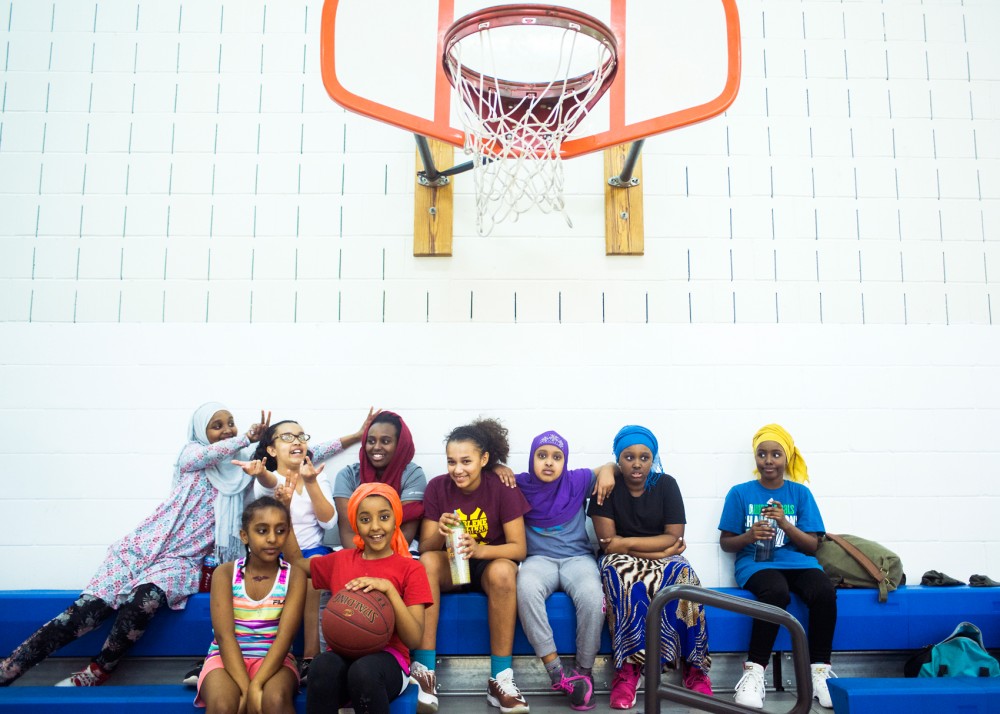Agroup of loud, energetic and sometimes-confused girls ran drills as their coach guided them on how to strongly pass a basketball. Most wore scarves on their heads and took breaks to adjust them, tucking in loose ends.
The Cedar Riverside Community Traveling Basketball program started its first season this year under the direction of Jennifer Weber, coach and founder of the program. One of the program’s six teams features special uniforms created by University of Minnesota designers.
“We’ve been planning and putting everything together for this,” Weber said, who thought of the idea six years ago. “It was a lot of work to get it started.”
The program has girls and boys teams from sixth to 10th grade, with 10-12 players per team.
Weber said she spent the past year trying to secure funding. Now, the program is partnered with the Cedar Riverside Community School and other organizations in the area.
“The kids here in the neighborhood need more quality programming,” Weber said. “The kids want it. They go to open gym all the time.”
Four coaches manage 76 kids total, helping them develop skills on the court and encouraging them in their academics, she said.
Teams practice twice weekly at either the Brian Coyle Center or Augsburg College, where the school lets them play for free, Weber said. Every three weeks, the teams have tournaments against others from around the Twin Cities.
Kinesiology and exercise psychology graduate Chelsey Thul said she worked on a Tucker Center study that investigated the barriers the neighborhood’s East African girls face in physical activities.
The 2008 study also gathered girls’ suggestions for sports programs, and participants noted the difficulty of finding appropriate clothing for activities, she said.
“They wanted to wear culturally sensitive [clothing] to make sure that they were upholding their norms — their cultural and religious norms of modesty and privacy,” Thul said.
The girls said long skirts would get in the way of dribbling the ball between their legs and their hijabs would fall off while running down the court.
The study found uniform troubles were secondary to the need for female-only activities, Thul said.
The result was the Girls Initiative in Recreation and Leisurely Sports — or G.I.R.L.S. — program. Thul said she has been a volunteer and consultant at the program for six years.
“Throughout the years in that program, we continued to hear the girls talk about clothing,” she said.
Thul said she decided to co-design culturally appropriate uniforms with girls from the neighborhood’s East African community.
“Other community partners were excited. The girls were excited by it. But I had no design knowledge,” she said.
Thul said she contacted Elizabeth Bye, a College of Design professor who shared her interest for the project. Together, they received a grant from the Minnesota Agricultural Experiment Station and started work on the project in 2013.
Bye said her area of interest is functionally designed clothes.
“Our department is focused on outreach and engagement with the community,” she said. “I was able to bring undergrad and grad students to work on the project.”
When the uniforms — which feature adjustable hijabs, knee-length skirts and breathable leggings — were finished, the College of Design held a fashion show in June to display them.
Coach Jennifer Weber also helped create the culturally appropriate uniforms.
“They are being put to use and in action,” Thul said. “The ultimate goal of the project was to co-create … girls’ activewear that would uphold their cultural religion and also increase their physical activity,” Thul said.
Samira Varqad, 12, plays on the sixth-grade girls team and also helped design the uniforms this summer.
“Every time we’re playing a game and we’re wearing our scarves, it’s always falling off, and we always had to worry about the scarf more than the ball,” Varqad said. “We decided that we would do something about it, and we made uniforms. It turns out that we can breathe in them. We don’t have to worry about our hijabs and stuff.”
She said her favorite part of the uniform is that it’s breathable.
“I felt … relieved and like I don’t have to worry about anything anymore,” she said.
Varqad said playing on the traveling team taught her how to persevere as a team, and she said she wants to play in the WNBA someday.
Coach and co-founder of the traveling basketball program Muna Mohamed is an exercise science senior at Augsburg College and grew up in the Cedar-Riverside area.
Mohamed said she became involved with the teams after meeting Weber through the G.I.R.L.S. program. Since then, Weber has mentored Mohamed and invited her to be a head coach in the new program.
“These girls are getting an opportunity to have culturally appropriate clothing, at the same time … [as] enjoying sports,” she said. “They don’t have to worry about fixing their scarves. They don’t have to worry about ‘How can I play basketball and also respect my culture?’ ”








